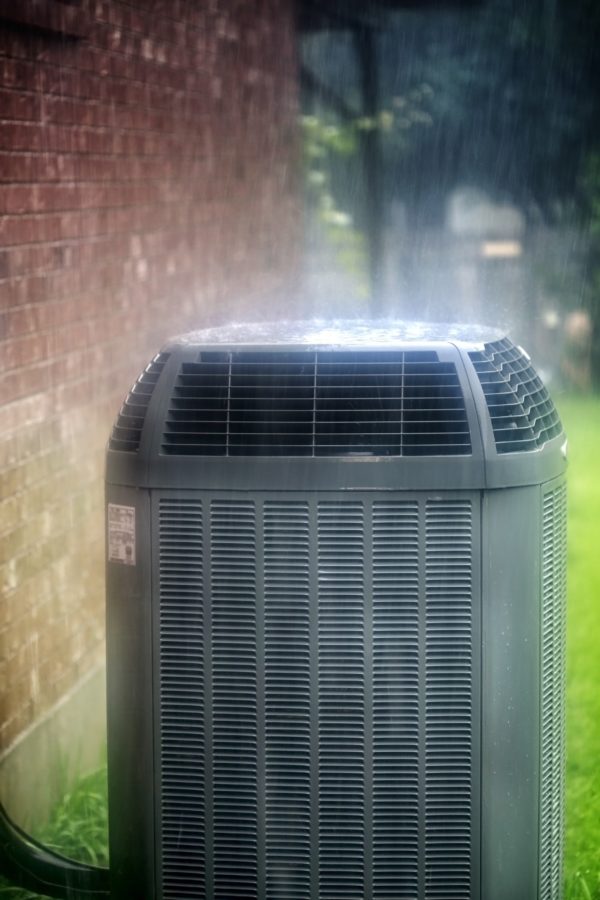Air Conditioning and Humidity in Your Home

If you’ve noticed that your home feels sticky or damp, you may be experiencing high humidity levels. High humidity levels can be caused by a few different things, including the weather, but if your home feels muggy, it’s a good idea to make sure that your air conditioning system is running properly and working the way it should be. High humidity levels in the home can often be a sign that your air conditioning system is failing.
Can an AC System Cause High Humidity Levels?
Generally, air conditioning systems should help to dehumidify your home, as opposed to increasing humidity in the home. If your home feels stickier or more humid than normal, it could be a sign that a key component of the system has failed or that the air conditioning unit isn’t working efficiently.
Most air conditioning systems work by pushing warm air over a series of coils located in the main air conditioning unit. These coils quickly cool the air, and that air is brought back into the home through vents, fans, and ducts, cooling each room to the proper temperature. As the warm air passes over the coils and cools, water vapor in the air also cools, and this can cause condensation.
In an air conditioning system that is working properly, any condensation that forms should catch on the coils and then fall down into a condensation pan. The moisture that gathers in the pan is then released away from the system and the home via a condensation drain. Although a small amount of water vapor can still enter the home through the air conditioning system, a system that is working properly should instead remove most of the moisture and keep it from reentering the home. As air is cycled from the home and back into the air conditioning unit, more and more moisture is removed, further decreasing humidity levels.
Humidity can rise in the home when the condensation drain or the cooling coils aren’t working properly. If the cooling coils do not have enough refrigerant to efficiently cool warm air as it passes over them, they might not be cold enough to liquefy water vapor. This vapor is then instead carried into the home, which raises the humidity level.
If the cooling coils don’t have enough refrigerant and aren’t working efficiently, this can also cause issues with cooling the home. The system may need to run for longer or work harder to reach the correct indoor temperature. This can, in turn, raise electricity costs and can put a strain on the system, which can sometimes cause older or more delicate pieces in the unit, such as the motor or compressor, to fail.
High humidity levels can also occur if the condensation drain is clogged. In this case, moisture can’t exit through the drain. The condensation pan can then fill, overflowing and leaking water. This can cause water damage to the air conditioning unit or the other parts of the home. A puddle of water near the air conditioning unit also means that more moisture will be carried into the home through the system as air is sucked in, cooled, and released into the home.
An air conditioning system technician can quickly unclog a condensation drain or check refrigerant levels, so having your system serviced on schedule can often eliminate any high humidity issues.
Air Conditioning Systems, Efficiency, and Humidity Levels
Even when your air conditioning unit is functioning properly, you might still find that your home is more humid than it should be. This can be caused by a few different things.
If your home feels too humid, it could be a sign that your air conditioning system is too small for the size of the home. A system that’s too small won’t be able to keep up with the amount of air in the home. Although it can take away some of the moisture, it won’t be able to remove all of it. A system that’s too small will also usually have to run for longer and work harder to cool the home, so it is less efficient and can often be more costly. This can also put a strain on the system.
Conversely, if your system is the correct size but isn’t running for long enough at a time, it can also cause humidity problems. For example, if the weather outside has cooled down, as it might after a rain shower, the system might not turn on because the temperature inside is already cool enough. However, when the system isn’t running, it isn’t pulling any moisture from the air, so it is not actively dehumidifying the home. With the system off, air and moisture can seep in from the outside, and this happens frequently after rain or at night when the system runs less often.
If your system hasn’t been on for a couple of hours and your house feels muggy, you can quickly decrease the humidity level by turning the system on and letting it run. You can turn the temperature down a degree or two, and this should take away a bit of the humidity in the home.
Although it might seem like a waste of energy and electricity to turn your system on when the home is already cool, it can actually be more beneficial to do so. Systems that run for long periods of time tend to use less energy than systems that turn on and off frequently. Making sure your system is running efficiently and for the proper amount of time can increase the life of the system, decrease your electricity costs, and decrease the humidity in the home.
Lastly, if you live in a very humid area, the air conditioning system might not be able to effectively remove all of the moisture from the air, so your home can still feel a bit damp. In this case, you might want to look into dehumidifying the home. You can use small humidifiers to target specific areas of the home, but these can be a hassle to continuously empty.
Another solution is to choose a whole-home dehumidifier. This system works together with your air conditioning system to remove excess moisture from the air in the home. It fits into the air conditioning system itself and captures and then releases excess moisture into a holding tank or away from the home.
Trust the Experts to Solve Any Issues
If you suspect that you have a humidity problem and that it might be caused by your air conditioning unit, call us at Hoff Heating & AC today. We’re experts when it comes to cooling, heating, and indoor air quality, and our expertly trained NATE-certified technicians will be happy to help with any maintenance, servicing, or repairs you might need. We can also help with installations. We’re family owned and have more than 30 years of hands-on experience and an A+ rating from the Better Business Bureau. We’re proud to serve the counties of St. Charles, Lincoln, Warren, and St. Louis, Missouri and the surrounding

